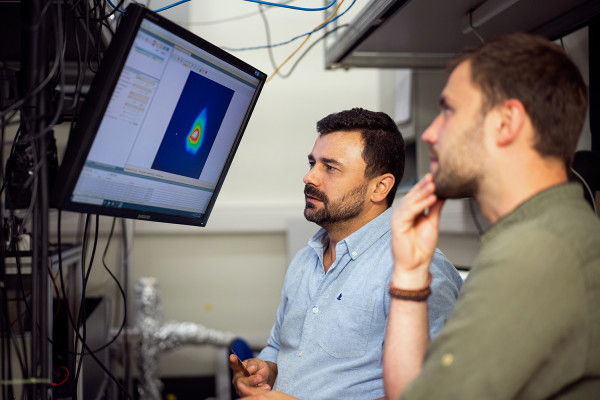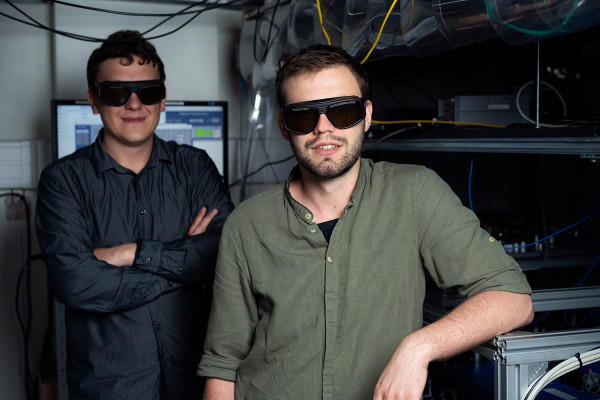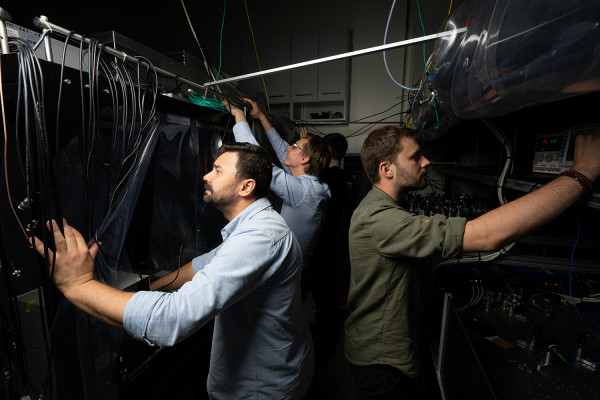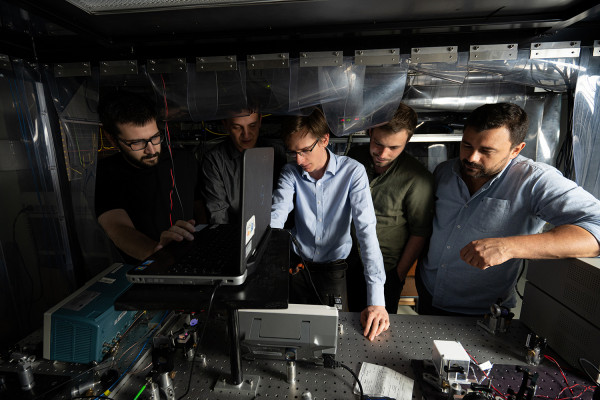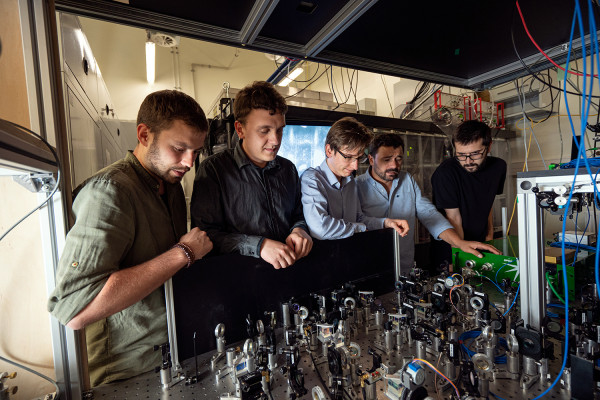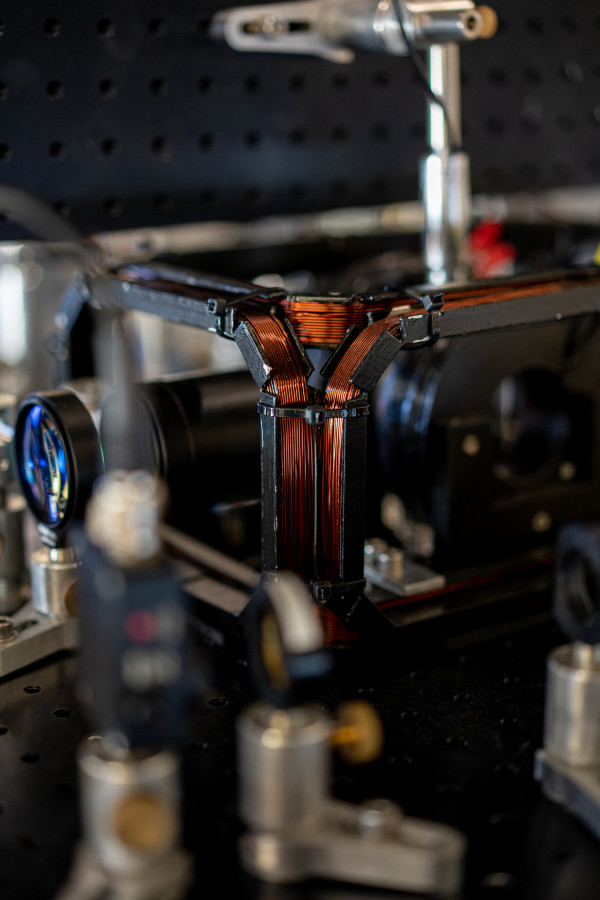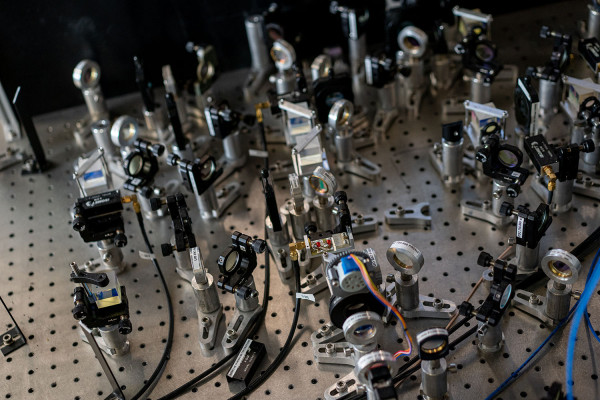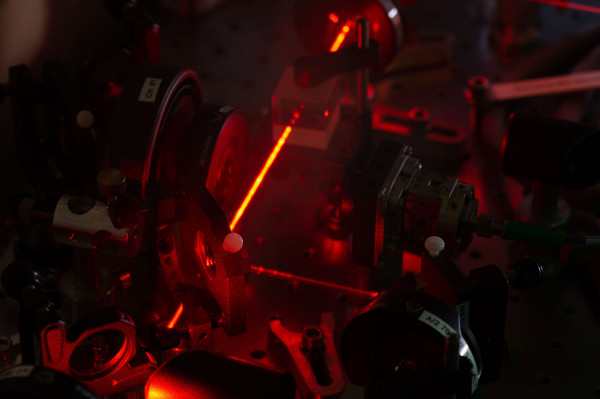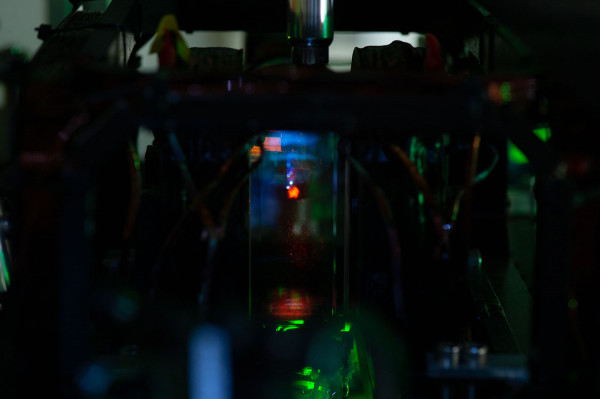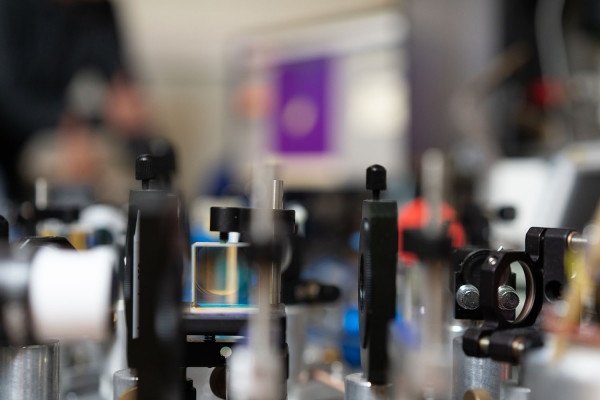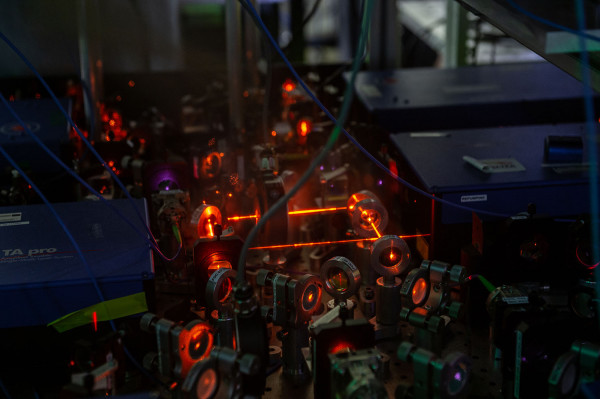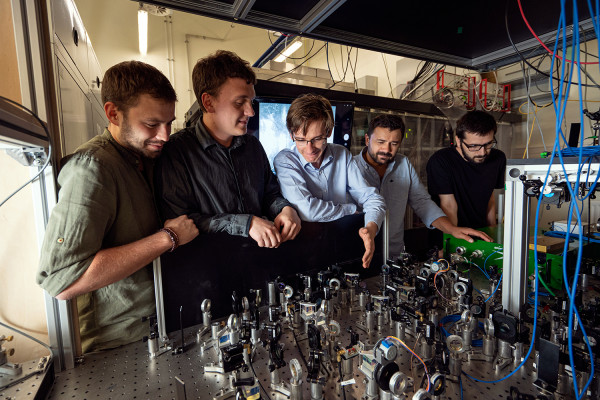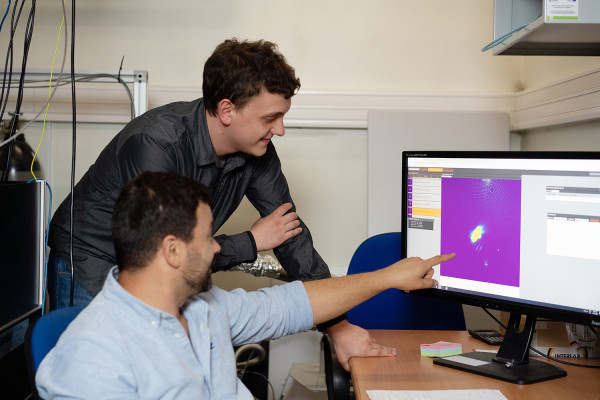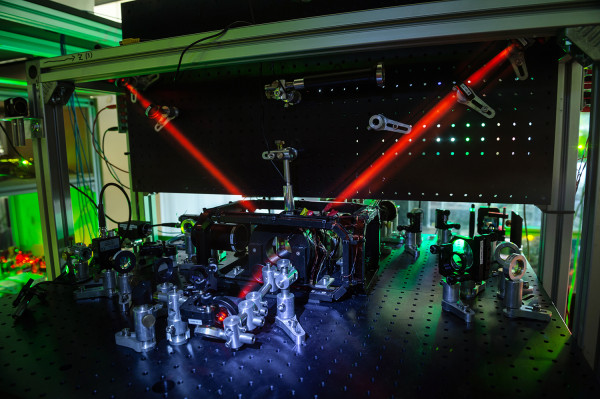Molecular Spectroscopy and Ultracold Quantum Gases Laboratory (QGL)

Team leader
Research topics
We use laser technique of polarization labelling spectroscopy to study excited states of diatomic molecules, particularly these states which are important in experiments on ultra-cold matter. For this reason we focus our research on homo- and heteronuclear alkali dimers and alkali atom - alkaline earth atom molecules. Basing on experimental observations the potential energy curves of investigated states are constructed using the pointwise Inverted Perturbation Approach method developed in our group.
We also focus on several intertwined topics of modern AMO physics, in particular on the development of new laser cooling methods and formation of ultracold ground state molecules of cesium and potassium. In a project “Cold atom-based quantum simulators” financed by the Foundation for Polish Science’s Homing grant we investigate the possibility of direct laser cooling of cesium to quantum degeneracy. This would speed up the time required to obtain quantum degenerate gas (laser cooling is orders of magnitude more efficient than evaporative cooling).
Members
-
ORCID ID: 0000-0001-5626-3414
22 55 32 710

-
ORCID ID: 0000-0003-2498-7623
22 55 32 710
Molecular spectroscopy
The main objective of spectroscopy of diatomic alkali metal molecules has always been to compare the structure of their electron states with theoretical predictions. Interest in this structure has been greatly revived by recent advances in the fabrication of cold alkali metal molecules, as detailed knowledge of the electron states of the molecules is particularly important for the realisation of this process.
Polarisation labelling spectroscopy (PLS) is an efficient method for simplifying complex molecular spectra, combining the principles of polarisation spectroscopy and double optical resonance. The basic idea of the method is to monitor polarisation changes of a weak sample laser beam, which are induced by the optical anisotropy of the sample produced by a strong pumping laser beam. In contrast to the classical PLS scheme, in our experiments we use a sampling laser with a fixed frequency, while the pump laser light is tuned in the spectral interval under study.
The frequencies of the observed spectral lines are converted into energies of oscillation-rotation levels. The excited state is then represented by a potential energy curve determined numerically using our unique implementation of the Inverse Perturbation Approach (IPA) method. This method allows the construction of potentials even with exotic shapes for which traditional description methods fail. To date, we have studied more than 90 excited states in the alkali dimers Li2, Na2, K2, Rb2, Cs2, LiCs, NaCs, NaRb, NaK and KLi using the PLS technique.
Laser cooling of caesium and potassium for quantum degeneration
We use Raman cooling in an optical network to increase the density of atoms in the phase space using only optical methods. In this approach, cooling is a more on an order of magnitude faster process than in evaporative cooling approaches. Developed experimental methods will allow efficient production of ultra-cold particles trapped in optical networks and, thus, they will contribute to the onset of a new generation of analog quantum simulators for the simulation of properties of the strongly interacting matter.
Boson-fermion mixture of potassium isotopes
The ultra-cold mixture of potassium-39 and potassium-40, which we have received, allows us to attempt to observe the p-wave superfluidity in quantum gases, thus it gives us a tool to study properties of exotic superconductors. We expect that this achievement will contribute to a better understanding of existing theoretical models describing this phenomenon and will guide the development of these models, allowing us to develop realistic systems of technological significance.
Atomic Interferometry
As a part of the NLPQT project, we are working on a construction of a mobile station for atomic interferometry. The use of matter waves of ultra-cold atoms will allow us to construct a gradiometer enabling absolute measurement of gravitational field intensity. Thus, the device will be a sensor, which will not require any calibration and allow the detection of objects below the surface of the earth, such as minerals, abandoned shafts or military objects. With absolute measurements, the device will enable inertial navigation using gravitational field maps without the need for the use of the GPS.
2023
J. Phys. Chem. A 127
- Szczepkowski/ J.
- Gronowski / M.
- Grochola/ A
- Jastrzebski/ W.
- Tomza/M.
- P. Kowalczyk
2021
Spectrochimica Acta A255, 119643
On the 31Πu state in caesium dimer
- J. Szczepkowski
- A. Grochola
- W. Jastrzebski
- P. Kowalczyk
2020
Journal of Molecular Structure 1208, 127858
Polarisation labelling spectroscopy of rubidium dimer: highly excited 81Σ+u, 91Σ+u and 81Πu states
- W. Jastrzebski
- A. Grochola
- J. Szczepkowski
- P. Kowalczyk
2020
Journal of Quantitative Spectroscopy and Radiative Transfer 248, 106984
- J. Szczepkowski
- A. Grochola
- P. Kowalczyk
- W. Jastrzebski
2019
Phys. Rev. A100, 012507
Double-minimum 31Sigma+u state in Rb2: Spectroscopic study and possible applications for cold-physics experiments
- A. Pashov
- P. Kowalczyk
- W. Jastrzebski
2019
J. Quant. Spectrosc. Rad. Transfer 239, 106650
The spin-orbit coupling of the 61Pi and 43Pi states in KCs: Observation and deperturbation
- J. Szczepkowski
- A. Grochola
- P. Kowalczyk
- W. Jastrzebski
- E.A. Pazyuk
- A.V. Stolyarov
- A. Pashov
2018
J. Mol. Spectrosc. 347, 48 – 55
Absolute vibrational numbering from isotope shifts in fragmentary spectroscopic data
- A. Pashov
- P. Kowalczyk
- W. Jastrzebski
2018
Journal of Quantitative Spectroscopy and Radiative Transfer 204, 131-137
Spectroscopic study of the C(3)1Σ+ ← X1Σ+ and c(2)3Σ+ ← X1Σ+ transitions in KCs molecule
- J. Szczepkowski
- P. Kowalczyk
- A. Grochola
- W. Jastrzebski
2018
J. Quant. Spectrosc. Rad. Transfer 221, 225-232
- A. Pashov
- P. Kowalczyk
- A. Grochola
- J. Szczepkowski
- W. Jastrzebski
2018
Physical Chemistry Chemical Physics, 20, 26221-26240
The RbSr 2Σ+ ground state investigated via spectroscopy of hot & ultracold molecules
- A. Ciamei
- J. Szczepkowski
- A. Bayerle
- V. Barbé
- L. Reichsöllner
- S. M. Tzanova
- Chun-Chia Chen
- B. Pasquiou
- A. Grochola
- P. Kowalczyk
- W. Jastrzebski
- F. Schreck
2018
J. Mol. Spectrosc. 354, 60-64
Spectroscopic study of the 71Pu and 71S+u states of Rb2 molecule
- W. Jastrzebski
- A. Grochola
- K. Olkowska
- J. Szczepkowski
- P. Kowalczyk
2018
J. Quant. Spectrosc. Rad. Transfer 210, 217 – 224
Experimental and theoretical study of the B(2)2Σ+→X(1) 2Σ+ system in the KSr molecule
- J. Szczepkowski
- A. Grochola
- P. Kowalczyk
- O. Dulieu
- R. Guérout
- P. S. Żuchowski
- W. Jastrzebski
2017
J. of Quantitative Spectroscopy and Radiation Transfer 202, 328-334
The coupled system of (5) 1 Σ u + and (5) 1 Π u electronic states in Rb
- I. Havalyova
- A. Pashov
- P. Kowalczyk
- J. Szczepkowski
- W. Jastrzebski
2017
Journal of Quantitative Spectroscopy and Radiative Transfer 202, 328-334
The coupled system of (5)1Σ+u and (5)1Πu electronic states in Rb2
- I. Havalyova
- A. Pashov
- P. Kowalczyk
- J. Szczepkowski
- W. Jastrzebski
2016
Review of Scientific Instruments 87, 033113
Transparent electrodes for high E-field production using a buried indium tin oxide layer
- W. Gunton
- G. Polovy
- M. Semczuk
- K. W. Madison
2016
Review of Scientific Instruments 87, 043111
An adaptable dual species effusive source and Zeeman slower design demonstrated with Rb and Li
- W. Bowden
- W. Gunton
- M. Semczuk
- K. Dare
- K. W. Madison
2016
Chem. Phys. Lett. 666, 19-21
Investigation of highly excited electronic 1Pi states in KLi molecule
- W. Jastrzebski
- P. Kowalczyk
- J. Szczepkowski
2016
J. Mol. Spectrosc. 330, 96-100
Potential energy curve of the D(3)1Piu state in rubidium dimer from spectroscopic measurements
- W. Jastrzebski
- P. Kowalczyk
2015
J. of Chemical Physics 142, 234308
- P. Kowalczyk
- W. Jastrzebski
- J. Szczepkowski
- E. A. Pazyuk
- A.V. Stolyarov
2015
J. of Chemical Physics 143, 044308
- W. Jastrzebski
- J. Szczepkowski
- P. Kowalczyk
- A. R. Allouche
- P. Crozet
- A. J. Ross
2014
Chem. Phys. Lett. 614, 36-40
Experimental investigation of the 61Σ+ ‘shelf’ state of KCs
- J. Szczepkowski
- A. Grochola
- W. Jastrzebski
- P. Kowalczyk
2014
J. Quant. Spectrosc. Rad. Transfer 145, 147-152
Study of the A1S+ and b3P0 states in LiCs by polarization labelling spectroscopy technique
- A. Grochola
- J. Szczepkowski
- W. Jastrzebski
- P. Kowalczyk
2013
Chemical Physics Lett. 586, 16-20
Polarisation labelling spectroscopy of the D1Π state in NaLi molecule
- N. Bang
- D. Khoa
- N. Dung
- J. Szczepkowski
- W. Jastrzebski
- P. Kowalczyk
- A. Pashov
2013
Chem.Phys. Letters 576, 10-14
Study of the 41Π state in KCs molecule by polarisation labelling spectroscopy
- J. Szczepkowski
- A. Grochola
- W. Jastrzebski
- P. Kowalczyk
2013
European Physical Journal - Special Topics 222. 2329-2333
The 41Σ+ electronic state of LiCs molecule
- J. Szczepkowski
- P. Jasik
- A. Grochola
- W. Jastrzebski
- J. Sienkiewicz
- P. Kowalczyk
2013
Chem.Phys.Lett. 586, 16-20
Polarization labelling spectroscopy of the D(singlet)Pi state in NaLi molecule
- N. Bang
- D. Khoa
- N. Dung
- J. Szczepkowski
- W. Jastrzebski
- P. Kowalczyk
- A. Pashov
2012
J.of Molecular Spectroscopy 276, 19-21
On the 41Σ+ state of the KCs molecule
- J. Szczepkowski
- A. Grochola
- W. Jastrzebski
- P. Kowalczyk
2012
Chemical Physics Letters 535, 17-20
The A1Σ+ electronic state of KLi molecule
- A. Grochola
- J. Szczepkowski
- W. Jastrzebski
- P. Kowalczyk
2011
J. of Chemical Physics 135, 044318-044323
Experimental investigation of electronic states of LiCs dissociation to Li(22s) and Cs(52D) atoms
- A. Grochola
- J. Szczepkowski
- W. Jastrzebski
- P. Kowalczyk
2011
Phys. Review A 84, 012507-012512
Spin-forbidden c 3+( = 1) ← X 1+ transition in NaCs: Investigation of the = 1 state in hot and cold environments
- A. Grochola
- P. Kowalczyk
- J. Szczepkowski
- W. Jastrzebski
- A. Wakim
- P. Zabawa
- N. Bigelow
2010
Chemical Physics Letters 497, 22-25
Investigation of the B1Π state in NaCs by polarisation labelling spectroscopy
- A. Grochola
- P. Kowalczyk
- W. Jastrzebski
2010
Journal of Physics B 43, 155102-155106
Rydberg states of Li2 molecule studied by polarization labelling spectroscopy
- A. Grochola
- P. Kowalczyk
- W. Jastrzebski
2010
Chemical Physics Letters 499, 36-39
The 41Σ+ electronic state of KLi molecule
- J. Szczepkowski
- A. Grochola
- W. Jastrzebski
- P. Kowalczyk
2010
Optica Applicata 40, 577-585
Analysis of the mutually perturbed (31∏u, 41∏u) ← X1∑g+ band system in Li2
- Z. Jędrzejewski-Szmek
- A. Grochola
- W. Jastrzebski
- P. Kowalczyk
2009
Spectrochim. Acta A 73, 117-120
The potential energy barrier of the 21P state in KLi
- W. Jastrzebski
- P. Kowalczyk
- A. Pashov
- J. Szczepkowski
2009
J.Chem.Phys. 130, 124307
Polarization labeling spectroscopy of highly excited Π1Π1 and Σ1+Σ1+ states in NaLi
- N. H. Bang
- A. Grochola
- W. Jastrzebski
- P. Kowalczyk
2009
Phys.Rev. A 79, 042716
- E. Tiemann
- H. Knockel
- P. Kowalczyk
- W. Jastrzebski
- A. Pashov
- H. Salami
- A. Ross
2009
Chem.Phys. 362, 130-134
- I. D. Petsalakis
- G. Theodorakopoulos
- A. Grochola
- P. Kowalczyk
- W. Jastrzębski
2008
J. Mol. Spectrosc. 250, 27-32
Investigation of the D 1Π state of NaK by polarisation labelling spectroscopy
- A. Adohi-Krou
- W. Jastrzebski
- P. Kowalczyk
- A. V. Stolyanov
- A. Ross
2008
Mol.Phys. 106, 1375-1378
Spectroscopic study of the 61Πu state in Li2
- A. Grochola
- W. Jastrzebski
- P. Kowalczyk
2008
Acta Phys.Pol.A 114, 731-738
Investigation of the Spin-Orbit Perturbation of the 61Π State in KLi Molecule
- W. Jastrzebski
- P. Kowalczyk
2007
Chem. Phys. Lett. 458, 64-66
Experimental investigation of the 61Π and 71Π electronic states of KLi
- Z. Jędrzejewski-Szmek
- D. Łubiński
- P. Kowalczyk
- W. Jastrzebski
2007
Chem.Phys. 333, 214-218
The C1Πu and [image] states in Li2: Experiment and comparison with theory
- M. Kubkowska
- A. Grochola
- W. Jastrzebski
- P. Kowalczyk
2007
Chem.Phys.Lett. 444, 229-231
The 51Πu electronic state of the lithium dimer
- Z. Jędrzejewski-Szmek
- A. Grochola
- W. Jastrzebski
- P. Kowalczyk
2007
Chemical Physics Letters 440, 199-202
First observation of the 31Π and 41Π states of NaLi molecule
- N. H. Bang
- A.Grochola
- W. Jastrzebski
- P. Kowalczyk
2007
Eur. J. Phys. 28, 789-796
Cavity ring down spectroscopy experiment for advanced undergraduate laboratory
2006
Optica Appl. 36, 499-504
Investigation of a highly excited electronic 1Π state of NaLi molecule
- N. H. Bang
- A. Grochola
- W. Jastrzebski
- P. Kowalczyk
- H. Salami
2006
Optica Appl. 36, 469-473
The 61Πu state of Na2 molecule
- A. Grochola
- M. Kubkowska
- W. Jastrzebski
- P. Kowalczyk
2006
J.Chem.Phys. 124, 2043088
Experimental long range potential of the BΠ1BΠ1 state in NaRb
- A. Pashov
- P. Kortyka
- W. Jastrzebski
- P. Kowalczyk
2006
Optica Appl. 36, 511-522
Exotic states of diatomic molecules and methods of their description
- P. Kowalczyk
- W. Jastrzebski
- A. Pashov
2005
Opt. Commun. 246, 569
- M. Szkulmowski
- M. Wojtkowski
- T. Bajraszewski
- I. Górczyńska
- P. Targowski
- W. Wasilewski
- P. Kowalczyk
- C. Radzewicz
2005
Chem.Phys. Lett. 404, 323-326
Experimental characterisation of the double minimum 61Σ+ state in NaRb
- P. Kortyka
- W. Jastrzebski
- P. Kowalczyk
2005
Eur.Phys.J. D36, 57-65
Accurate characterisation of the C(3)1Σ+ state of the NaRb molecule
- W. Jastrzebski
- P. Kortyka
- P. Kowalczyk
- O. Docenko
- M. Tamanis
- R. Ferber
- A. Pashov
- H. Knockel
- E. Tiemann
2005
Acta Phys.Pol. A108, 421-429
Polarisation Labelling Spectroscopy of Highly Excited (Rydberg) 1Πu States in Potassium Dimer
- W. Jastrzebski
- P. Kowalczyk
2005
J.Mol.Spectrosc. 233, 290-292
New observation and analysis of the E(4)1Σ+ state in NaLi
- N. H. Bang
- W. Jastrzebski
- P. Kowalczyk
2004
J.Mol.Spectrosc. 224, 151-156
Experimental and theoretical investigation of the 61Σ+u and 71Πu states of K2
- A. Grochola
- W. Jastrzębski
- P. Kowalczyk
- S. Magnier
- M. Aubert-Frecon
2004
J.Mol.Spectrosc. 226, 95-102
On the C1Σ+ state of NaK
- A. Ross
- P. Crozet
- I. Russier-Antoine
- A. Grochola
- P. Kowalczyk
2004
J.Chem.Phys. 121, 5754-5760
A regularized inverted perturbation approach method: Potential energy curve of the 4 1Σ+u4 1Σu+ state in Na2
- A. Grochola
- P. Kowalczyk
- W. Jastrzebski
- A. Pashov
2004
Mol.Phys. 102, 1739-1742
Polarization labelling spectroscopy of the 41Π state of KLi
- A. Grochola
- W. Jastrzebski
- P. Kortyka
- P. Kowalczyk
2003
Chem.Phys.Lett. 374, 297-301
Potential curve of the 41Σ+ state of NaK by polarisation labelling spectroscopy
- W. Jastrzębski
- R. Nadyak
- P. Kowalczyk
2003
J.Mol.Spectrosc. 221, 279-284
Experimental study of the and states of NaK by polarization labeling spectroscopy technique
- A. Grochola
- W. Jastrzębski
- P. Kortyka
- P. Kowalczyk
2003
Phys.Chem.Chem.Phys. 3, 3443-3452
The Cu*(2D5/2 and 2D3/2) chemiluminescent reactions with ClF
- N. Sadeghi
- P. Kowalczyk
- D.W. Setser
2003
J.Mol. Spectrosc. 220, 162-169
The E(4) 1Πu state in K2 and its perturbations
- P. Kowalczyk
- S. Kasahara
- Md.H. Kabir
- H. Kato
2003
Chem.Phys.Lett. 372, 173-178
The molecular constants and potential energy curve of the D1Π state in KLi
- A. Grochola
- W. Jastrzębski
- P. Kowalczyk
- A. Ross
- P. Crozet
2002
Spectrochim. Acta A 58, 2193-2197
Spectroscopic study of the E(4)1Σ+ state in NaLi
- W. Jastrzębski
- P. Kowalczyk
- R. Nadyak
- A. Pashov
2002
Acta Phys. Pol. 102, 729-738
The C1Σ+ State of KLi Studied by Polarisation Labelling Spectroscopy Technique
- A. Grochola
- P. Kowalczyk
- W. Jastrzębski
- A. Ross
- P. Crozet
2001
J.Chem. Phys. 114, 10725-10727
The ES1S+g state of lithium dimer revised
- W. Jastrzębski
- A. Pashov
- P. Kowalczyk
2001
J.Chem.Phys. 115, 4118-4124
On the X 1∑+X 1∑+ state of KLi
- F. Martin
- P. Crozet
- A. Ross
- M. Aubert-Frecon
- P. Kowalczyk
- W. Jastrzębski
2001
J.Mol.Spectrosc. 209, 50-56
The Perturbation of the B1Π and C1Σ+ States in KLi
- W. Jastrzębski
- P. Kowalczyk
- A. Pashov
2001
Proc. SPIE 4397, 251-255
Determination of accurate potential energy curves for diatomic molecules
- W. Jastrzebski
- W. Jaśniecki
- P. Kowalczyk
- A. Pashov
2000
J.Chem. Phys. 112, 5740-5750
The c 3Σ+,c 3Σ+, b 3Π,b 3Π, and a 3Σ+a 3Σ+ states of NaK revisited
- R. Ferber
- E.A. Pazyuk
- A. Zaitsevskii
- P. Kowalczyk
- H. Chem
- H. Wang
- W.C. Stwalley
2000
Phys.Rev.A 62, 042509
Spectroscopic investigation of the double-minimum 21Σ+ustate of the potassium dimer
- W. Jastrzębski
- W. Jaśniecki
- P. Kowalczyk
- R. Nadyak
- A. Pashov
2000
J.Mol.Spectrosc. 203, 264-267
Accurate Potential Curve for the Double Minimum 21 Su1 State of Na2
- A. Pashov
- W. Jastrzebski
- W. Jaśniecki
- V. Bednarska
- P. Kowalczyk
2000
J.Chem.Phys. 113, 6227-6234
Doppler-free UV-visible optical–optical double resonance polarization spectroscopy of the 2 1Σ+u2 1Σu+ double minimum state and the C 1ΠuC 1Πu state of Li2
- S. Kasahara
- P. Kowalczyk
- Md.H. Kabir
- M. Baba
- H. Kato
2000
J.Chem.Phys. 113, 6624-6628
The Li2Li2 F 1Σ+gF 1Σg+ “shelf” state: Accurate potential energy curve based on the inverted perturbation approach
- A. Pashov
- W. Jastrzebski
- P. Kowalczyk
2000
J.Phys.B 33, L611-614
An improved description of the double minimum 6 [$^1\Sigma^+$] state of NaK by an IPA potential energy curve
- A. Pashov
- W. Jastrzebski
- P. Kowalczyk
2000
Spectrochimica Acta A57, 1829-1831
The C(2)1Πu state of Na2 molecule studied by polarization labelling spectroscopy method
- W. Jastrzebski
- P. Kowalczyk
- J.J. Camacho
- A. Pardo
- J.M.L. Poyato
2000
Comput.Phys. Commun. 128, 622-634
Construction of potential curves for diatomic molecular states by the IPA method
- A. Pashov
- W. Jastrzębski
- P. Kowalczyk





